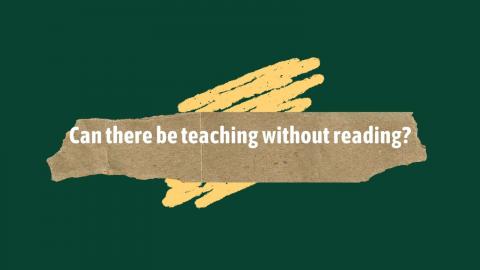
Can There Be Teaching Without Reading?
Some of my students often notice a book on my table, or hear a book reference in my conversations. One day, a student asked, with genuine curiosity, “Sir, which exam are you preparing for?”
Reading has become so closely associated with examinations in our daily life that reading beyond exams feels outdated. So much so, that the student couldn’t hide a sarcastic smile when she realised I was referring to a book in almost every important aspect of the lesson I was discussing.
I replied, “I’m reading to teach. How can I teach if I don’t read?”
That seemed to surprise him. The idea that teachers need to read feels outdated too. “But don’t teachers already know enough to teach?”
On the contrary, I often wonder—how can a teacher teach without reading?
This question calls for a deeper look at what teaching really is. If teaching is merely the repetition of pre-determined facts, then perhaps reading isn’t needed. Many teachers have been teaching the same content for years—they can reproduce it with confidence. But if we see each classroom interaction as an opportunity to help students think more critically and holistically about a topic, then no amount of preparation feels sufficient. That kind of preparation requires deep engagement with critical texts and current thinking in the field. Especially in higher education, where concepts are dense and layered, how can teaching rely on simple definitions?
For instance, if I’m teaching “What is curriculum?”, can there be one reading that fully captures the complexity of that question? Even after reading Freire, Bruner, Krishna Kumar, bell hooks, Dewey, Howard Gardner, Michael Apple, and so many others, I still find new layers waiting to be explored. The concept keeps unfolding—and so must our reading.
Of course, there are constraints—time, course requirements, the scope of a diploma versus a PhD. A student in a doctoral program will explore differently than one in a teacher-training diploma. But that only means acknowledging the limitation: “Given the time and scope, I could only go this far—but I know there’s much more.” And even to recognise those limitations, a teacher has no escape but to read.
There’s another question I often pose to my student-teachers: If we expect future students to read—not just for exams but for deeper understanding—how will that ever be possible if their own teachers aren’t readers themselves? Can someone who doesn’t read, truly inspire reading? Their own experience gives the answer. Were they ever inspired to read by a teacher who didn’t read?
Prof. Krishna Kumar has addressed the first question beautifully—that reading has been reduced to a means for passing exams, and once the exam ends, so does reading. His book Padhna, Jara Sochna reflects on this very crisis.
But the second question remains wide open—how can there be teaching without reading? And if there is, is that even worth calling teaching?
- Log in to post comments
